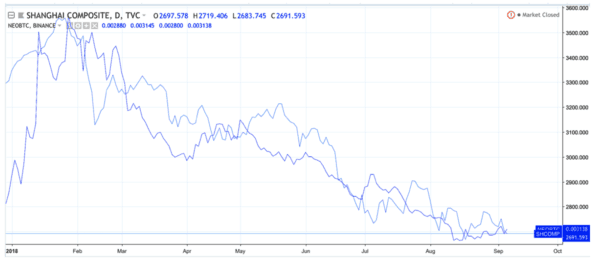As the second largest world economy, China is important to examine when considering the crypto market. For most of us, the world revolves around markets, news, and innovation within the United States. However, many may be missing moves made by the Chinese government as it relates to crypto-assets and blockchains.
Popular opinion is that China is taking a “blockchain first” approach to crypto, focusing on permissioned blockchain technology.
However, anyone who has studied blockchains and crypto knows that you cannot employ the true power of a blockchain without a token to economically incentivize the players. We hypothesize that the Chinese government now recognizes this, and is therefore shifting its focus from permissioned blockchains to fostering an actual crypto platform, preferably one that is homegrown.
History of Crypto in China – Sending Mixed Signals
On the surface, the Chinese government has sent a number of mixed signals over the years regarding blockchain. President Xi has mentioned blockchains as one of the technologies that will be important for China’s growth. Blockchain was added to China’s five-year technology plan back in 2016 and it is rumored that the People’s Bank of China is working on a national cryptocurrency to replace everyday fiat.
In the last year, however, the government has taken steps to continuously curb activity around buying and trading cryptocurrencies on a domestic and international level.
Pro Crypto |
Anti Crypto |
|
Dec 2016: Blockchain technology added to China’s five-year plan |
Sep 2017: ICOs and crypto to fiat exchanges banned |
|
May 2018: China Center for Information Industry Development (CCID) releases a public chain assessment index |
Jan 2018: P2P and OTC trading banned |
|
May 2018: President Xi mentions blockchain in a speech about revolutionary technologies |
Feb 2018: Access to foreign exchanges and ICO websites blocked |
|
Aug 2018: Bank of China pledges to increase investment in crypto |
Aug 2018: Crypto events banned WePay and Alipay block crypto purchases WeChat, Baidu close down crypto-related chat rooms |
Not a complete list
In the last month alone, technology giants Baidu, Tencent, and Alibaba have cracked down on crypto activity; crypto-related events were banned, and the Bank of China announced they will increase investments in blockchain. Furthermore, the most dominant company in Bitcoin mining, Bitmain, is based in China and planning an IPO.
China is no stranger to censoring outside information and businesses within its borders.
It is then no surprise they are progressing towards a state where outside crypto organizations are banned, while domestic, government-groomed businesses flourish with the assistance of the government and as the only viable option for everyday Chinese citizens.
A Little About NEO
NEO is an open-source smart contract platform based in China – The Chinese Ethereum. Their ultimate goal is to create a Smart Economy by offering legitimate digitization of assets on the blockchain that include the use of digital identity.
The digital identity portion of NEO utilizes cryptographic security protocols to verify the identity of a user, linking real-world and digital assets. Features of NEO, such as its compatibility with other platforms and developer friendly tools, have made it successful in the crypto world. Currently, it is the fourteenth largest crypto-asset by market cap.
The NEO project began in 2014, under the name AntShares. They raised an Initial Coin Offering in late 2016, issuing 50 million NEO tokens. The NEO Council kept an additional 50 million tokens and currently have 35 million in their possession (35% of outstanding) leading to critics to question the project’s centralization.
Onchain, created out of AntShares, is a private R&D company focused on developing blockchain infrastructure for enterprises. Onchain used the blockchain technology from NEO to create Distributed Network Architecture (DNA), a permissioned blockchain product that has received lots of funding and partnerships within China, including use as the foundation for government blockchain applications. It is clear that the future of blockchain in China will be driven by Onchain’s innovations.
Although they claim to be separate, NEO and Onchain share executives, development teams, and other resources. It does not take a leap of the imagination to assume that NEO is as cozy with the Chinese government as Onchain.
Why it’s important for China to have its own blockchain protocol with rising trade war tensions with the US
 Blockchains are by nature decentralized, which is why it is so hard for governments and regulators to control access and usage. Many regulators have begun to realize this and have done their best to create regulations around the decentralized framework.
Blockchains are by nature decentralized, which is why it is so hard for governments and regulators to control access and usage. Many regulators have begun to realize this and have done their best to create regulations around the decentralized framework.
However, when you have a more centralized blockchain like NEO, it is easier to control. For the Chinese government, a blockchain that it has access to, and a measure of control over, is far more desirable than a decentralized one where the founders, development resources, and money (crypto-assets) are far-flung and out of reach.
Rising trade war tensions have not helped the case for a decentralized blockchain either.
Since the beginning of 2018, tariffs on $250 billion worth of goods were levied against China. The threats of a trade war with the US has pushed China’s stock market lower throughout 2018. Our previous research has identified and investigated a correlation between the Shanghai Composite and the crypto market.
In addition to the negative impact tariffs will have on their economy, the Chinese may feel a greater need for independence from the rest of the globe in the form of technological innovations.
As the world’s second largest economy and most populous nation, they have no need to look for blockchains from outside their borders. Creating, incubating, and growing their own with their own talent pool, resources, and population is more than feasible.
The practice of currency devaluation within China has caused many of its citizens to seek pathways out of the Yuan.
Cryptocurrencies, such as Bitcoin, offered a great escape route for Chinese capital and in some cases, it became an access point for US dollars. Bitcoin and other cryptocurrencies are beyond the government’s control and regulation. NEO is not.
The Chinese government recognizes that as domestic equities have fallen and trade tensions have risen, its citizens will flock to crypto. They would prefer it be a crypto-asset that they have a degree of control over.
Bullish Case for NEO
The Chinese market as a whole has signaled the potential for a downturn: underperforming the Shanghai Composite, trade wars, and continuing currency devaluation. With no bottom in sight for Chinese equity markets, NEO could strengthen, particularly if the rest of the population is cut off from access to cryptocurrencies like BTC and ETH.
Additionally, based on China’s public curbing of crypto, we believe that NEO will likely become the only viable smart contract platform in China, pushing developers in China, both government and private sector, to build Dapps on it.
Of Note
- Following Wednesday’s assault, Horizon (ZEN) rose 20% on news that Grayscale made a $6 million investment in the privacy platform. Grayscale will add the ZEN investment trust to their suite of investment trusts.
- Monero (XMR) ended the week flat, as big gains early in the week offset the carnage from Wednesday’s selloff. XMR’s strength was unusual considering a report that the Mega Chrome Extension allows hackers to steal users’ XMR.
- China accounted for 56% of all blockchain related patents in 2017. Specifically, Alibaba filed 43 of them (10%).
- CEO of Twitter, Jack Dorsey, revealed in Thursday’s congressional hearing that they’re considering blockchain solutions to fight Twitter scams #TweetToken.
Steven McClurg is a founding partner and CIO at Arca Funds, a full service asset management firm specializing in blockchain. Prior to Arca Funds, Mr. McClurg was a Managing Director and Portfolio Manager at Guggenheim Partners. Mr. McClurg holds an MBA and MS from Pepperdine University, where he has served as a guest lecturer.
Katie Talati is Head of Research and Portfolio at Arca Funds. Ms. Talati is responsible for all research initiatives at Arca Funds, which includes fundamental research in all varieties of cryptocurrencies, blockchain technologies, as well as broad consideration of macroeconomics and other investment vehicles. She is the first female executive investment professional for a major blockchain asset manager and is a prominent member of the Silicon Beach startup community and leader in the women in tech community. Ms. Talati holds a Series 7, 63, and 79 (she is currently not registered as a broker) and is a graduate of UCLA.
Sources





